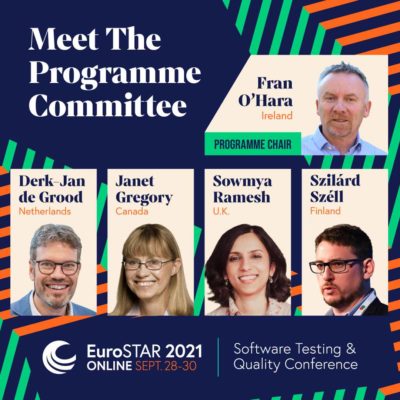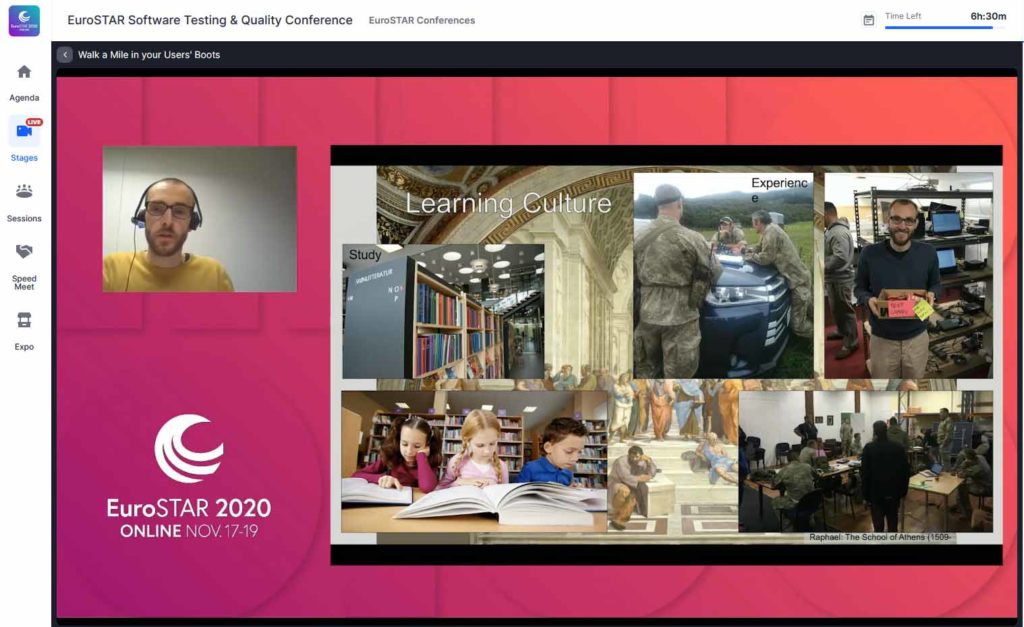
Spoiler alert: The Wizard of Oz is a very good man and a very bad wizard. But he does put on quite a show! I don’t suggest that our Programme Chair, Fran O’Hara, is the Great Oz, or that anyone on the Programme Committee would be the Wicked Witch of the West. But there are still a few parallels. A former colleague enjoyed pointing out that testers are indeed not wizards who fix problems by waving our magic wand. On the contrary, a lot of our work is to look beyond the magic and figure out how things are really operating. Here’s a wonderful clip from the Wizard of Oz:
When putting together a conference, a lot of credit is rightfully given to the people at the top – but there are a lot of people working behind the scenes to put the conference together. In addition to the tireless EuroSTAR team, there’s a lot of volunteers that help in various roles. In this post, I will share my small part in the big show, in appreciation of all the little things that helps create the big show.
Some weeks ago, I received an invitation to participate in reviewing the submissions for this year’s EuroSTAR conference. The Programme Chair and Programme Committee are overall responsible for putting the conference together, but with several hundred abstracts being submitted, they do need a helping hand with the initial screening. As a speaker at last year’s conference, I got invited, but others are free to sign up as well. I did not want to pass up on this opportunity to see what goes on behind the scenes and maybe learn a few tricks from others to see how they approach it, so I was quick to say yes.

I got assigned 25 abstracts to review and grade. I will not disclose the grading system, but if you followed the guidance when submitting your abstracts, there are no surprises. While the review process is “blind” – we are not given information on the speaker, it is sometimes possible to identify who the speaker is. We are asked to declare if there is a conflict of interest if the speaker is a friend or colleague.
I was a bit nervous that I may have been a bit harsh at times (it is the first time for me, and it is a great responsibility – I know how much heart and soul is invested into these abstracts), but Siobhán assured me that all abstracts were reviewed by multiple people, so one person’s opinion didn’t ruin your chances.
Here are my three takeaways:
- Community. I have been to a few conferences over the years and people have always been extremely helpful and supportive – The speakers, the organizers, the delegates. The community exists because people contribute to that atmosphere. I am grateful I got this opportunity to give it a little back to the community and play my small part in putting the next EuroSTAR conference together. Communities work best when everyone is contributing. I have been part of sports clubs, car communities, online gaming guilds and professional networks – and I always get drawn to play an active part. The more people who jump on board with this, the better and more active the community becomes. It is also a great way to make friends. Maybe reviewing a few submissions anonymously is not the preferred social platform to meet new testers, but perhaps it opens the door to something else. And we all must start somewhere – I am sure the program chair and committee have paid their dues behind the scenes as well.
- Curiosity. I recently watched a Q&A session with PhilosophyTube who make videos about different topics on philosophy. She mentioned that when assessing her videos, the first thing she would consider was if the video would be driven by curiosity, rather than ambition. Curiosity is, I think, an important trait in a tester. And it is just as important when being a reviewer. Curiosity is celebrating people for their thoughts and ideas, especially when they differ from your own. It is also about envisioning what it could be, rather than focusing on what it is right now. I hope I managed to remain curious about the abstracts – I did my best! There is a Danish expression, “finding the holes in the cheese” – focusing on the problems instead of the potential. Of course, it is part of the reviewing to focus on the potential problems – but applying a curious mindset comes first.
- Personal/professional development. It was only a few hours of work – but I learned a lot from it. An often touched subject in testing is cognitive biases – the example above of the mental battle between being curious and being critical is a great exercise in managing your biases. Also, seeing how others approached the abstract, takeaways and their supporting videos, helped me revisit my own submission from last year and see strengths and weaknesses in that. I have submitted several talks to the EuroSTAR conference over the years, and I have been fortunate enough to be selected twice. However, it is always accompanied by a great deal of anxiety – I find it very easy to be critical of my own work. While reviewing the abstracts, I discovered it is surprisingly easy to see what works and what doesn’t for others. It was a surprisingly powerful experience to consider this kindness to strangers – being the judge of someone else’s work and giving them the best chance to succeed when you know how much it meant to you when you were in their situation. And it was a great way to get a better assessment of my own work when having something to compare it to.
So, there you have it! EuroSTAR is after all not the creation of the great wizard, but the product of the hearts, brains and courage of a lot of good people! All in all, it was time well spent! I learned a lot, and I got a sneak peek at all the great submissions – many of which I hope to see on the virtual stage later this year. I can’t wait to see what the Programme Committee puts together! If you want to tip your cap to the reviewers who help put the conference, you can see their happy faces here. If it turns out that your abstract did not get selected, it wasn’t me! – but you are very welcome to reach out on LinkedIn if you want some feedback for your next submission!
The annual EuroSTAR Software Testing Conference will take place 28-30 Sept this year instead of the usual November and the Programme is due to launch end of April.
